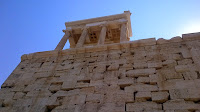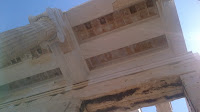 |
| With Christina Boutari enjoying The Grand Reserve |
Boutari was making the rounds and greeting guests and when she made her way to our table she chose a wine for us to sample ahead of the flight. In her perfect English with the sweetest of Greek accents she says directly to me, "I think you'll like this one." My group and I were delighted that we were having a personal tasting with her and anxious to try one of the new arrivals. But she only poured for me and insisted that I'd adore it. Odd. I take the glass from her and do my best impression of a wannabe sommelier, swirling the glass and taking it up to my nose. And as I do, my heart skips a beat and begins to race. I inhale deeply and I'm transported to my parents dining table. In a flash I can see the Sunday dinner spread out and the familiar wine bottle being opened by my father. I know this wine and I know it well.
My eyes welled up unexpectedly and I tried to hide it. "What is wrong? Have I chosen incorrectly? she asks. I felt exposed and vulnerable and not wanting to come off as a snob, I beamed up at her and exclaimed in a shaky voice, "This is a classic! It's the Grand Reserve, isn't it?" I prattled on trying to conceal that while I may physically be sitting next to her, mentally my mind has taken a trip to the spirit world...or has the spirit world come to me? Yes, indeed it was my father's all time favourite wine. Dad's 'go to red' that never disappointed and always made an awesome gift. I haven't tasted it for a least 10 years and there I was having a glass with Christina Boutari herself in a restaurant 3 minutes from my dads house. Startling.
And then it happened again.
The Complete Works of William Shakespeare was sitting lonely atop a pile of bargain bin priced hard cover books. I stopped and did a double take and stared at it for a moment. I was in a massive hurry, cutting through the downtown subway tunnels to make my Bloor train. The tunnel shops were busy and people were whizzing past me but the world just seemed to stop as I zeroed in on this book. My hand reached for it and it felt like a veil was coming down over me. That familiar book, its colour and size, its pencil sketch of Shakespeare, those thin almost newsprint pages took me back 25 years when I was a young girl dusting the window display at my dads bookstore. The Heritage Shop, on Yonge Street, was only up and running for one year, but what an indelible year indeed! Part bookstore, part art shop, it was his best and worst business ever.
The clerk interrupted my mind trip, "Hey, how did that book get into the outside bargain bin? Oh well, it's $3.99! Crazy right? It's asking you to love it...", I put the book down. The clerk picks it up, holds it out to me and continues "...or maybe its asking Can I love you?" The colour drained from my face and a chill ran up and down my spine. "I beg your pardon? What did you just say? Why would you say something like? What do you mean?" The clerk stepped back and I stepped toward him, clearly making him uncomfortable. "I don't know, just said it, don't take offence, just sounded poetic...the book made me say it!" He started to laugh and I started to feel ill. "Are you alright?" he queried and offered me to come in and have a seat and glass of water, but all I could choke out was, "'I'll buy the book."
It was a one-two punch. I was winded for the rest of the day. Finding the book, or more like the book found me, was one thing, but when those familiar words, Can I love you, tripped out of the clerks mouth...I knew it was no coincidence. What kind of a question is that? Who says that? My father did. It was his catch phrase. His trump card. I never did understand the question and what kind of a response did he expect? Was it rhetorical? Nevertheless, I've never heard anyone, before, during or after, ever ask that question.
Why I haven't thought of The Heritage bookstore in decades is a mystery! Gosh, I had great fun then and met some real interesting people. The book and art suppliers were an eccentric bunch and dad enjoyed introducing me because I had practically read all the books in the store, Lord knows he hadn't. The courage my father had! Truly. English as a second language and the only thing he'd ever read from cover to cover was the daily newspaper, but there he was selling The Complete Works of William Shakespeare, amongst other classics, without a flurry of doubt and with complete confidence. Wow. I do remember this one book supplier, Wil, that frequented the shop on his off hours to chat with dad. What a card! He totally loved my dad! And now that I look back on it, I wonder if he was writing a book of his own and profiling my dad for a character! I guess I'll never know, but dad as a character, is multi-faceted and you can't deny the tension that a love/hate relationship so deliciously provides for good story telling.
My girlfriends think its time we take a road trip to Long Island...and it wouldn't be for the ice-tea! LMAO! Although I'd likely need a very tall cold Long Island Iced Tea, if we were to ever get an audience with the Medium that resides there. Too funny! For those of you who don't know her, she apparently speaks to the dead.
A couple of friends are unabashedly addicted to the Long Island Medium, Theresa Caputo and her TV show on Sunday nights. It certainly is entertaining and I've become curious, considering all this "paranormal activity", yet cautious. My experience with the paranormal is limited and I'd like to keep it that way! I'm not so sure I should consider a trip to visit Caputo to find out what, if anything, dad is trying to communicate to me.
I'm not an overtly spiritual person and I'm rather quick to dismiss any ambiguous sign or symbol that could be interpreted as a form of communication from the other side. But how can you ignore this? Sure, I've dreamt of dad a lot since his passing, especially now that I'm building this Greek House and they have left me frightened. But I'd always conclude that they were, well...just dreams. However, these events are certainly not ambiguous!
But wait, there's more. Yes, that's right and as worn out, distraught and confused as I am, the rains in Kalamata this Spring brought a delightful, miraculous, thoughtful and hopeful sign. Irises.
Irises, from my Uncles description, aren't seen around Messinia. And there aren't any small animals, like squirrels, that would have dug the bulb up and transplanted them onto the Verga property. And even if there were, the soil isn't any good for growing much of anything especially these delicate and elegant flowers. The only catch here in laying claim that my dead father had something to do with this, is that his favourite flower is the Sunflower. However, having said that, this flower has become significant to me these past two years and the portrait that my dad gave me of himself year ago has a pewter frame of iris flowers! Not to mention that I've always enjoyed them in print form by Van Gogh and other impressionist artists and they have adorned my walls for several years and have brought me great joy. From what I understand, there are about a dozen of them, a sparse amount, surrounding my large Greek House as if to give it a gentle embrace. I'm overwhelmed.
February, March and now April all brought harbingers of dad's presence. This being the fifth anniversary of his death, I must admit, has been a positive reflection. I am quite grateful that I've been able to remember him and even experience him in softer, quieter and gentler ways.
And it isn't until this very moment that I finally understand this quote, "If a writer falls in love with you, you can never die."
And I guess in this case, destiny demands that every moment has a purpose.
.

























